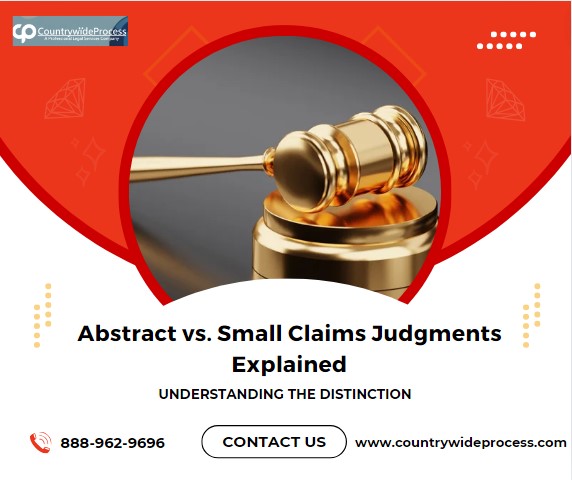The client has won a lawsuit or a small claims case, but that doesn’t mean the dollars will flow immediately. The final stage is to enforce and recover the judgment amount to pay the debt. This is where the abstract of judgment and small claims judgment enter the picture. Despite their origins in legal judgments, they differ significantly in terms of their application and consequences.
The Power of an Abstract of Judgment
An abstract judgment is a short and official form of court judgment in a regular lawsuit. It outlines the key details, including:
- The full name and address of the judgment creditor (winner) and judgment debtor (loser) should be provided.
- The total sum of money
- The interest rate, when specified,
- special orders
An abstract of judgment plays a crucial role in transforming a court judgment into enforceable collections. Here’s how:
Public Record and Lien Creation
The request for abstract of judgment puts the government on notice of the debt and is normally done with the county clerk’s office. It can be crucial for a variety of reasons.
- It disseminates information and confirms the debt’s existence.
- It provides a right to possess the judgment debtor’s real estate in that jurisdiction.
This lien effectively becomes tied to the property due to a judgment that hinders the debtor from selling or refinancing the mentioned property without meeting the judgment.
Enforcement Options
The theory for this is the abstract judgment, which puts the judgment creditor in a better position to enforce the judgment by providing a legal route of action. These may include:
- Wage Execution: This is a legal process in which the court requires the debtor’s employer to deduct part of the debtor’s wages in order to meet the debt obligation to the creditor until the amount is fully paid.
- Bank Levy: It refers to an order given by a court that stops the debtor from accessing some of their money lodged in a particular bank account.
- Asset Seizure and Sale: Finally, the court may allow the selling of the property of the debtor that has not been exempted with the aim of offering the yields to the victorious party.
Online e-filing and e-recording transactions are adopting methods of handling abstract judgment. Most jurisdictions have wet-form e-recording services for the request for abstract of judgment as well as for online e-filing it with the county clerk. This facilitates this and avails the above identified potent legal instrument faster.
The Streamlined World of Small Claims Judgments
Small claims courts are intended for cases that concern small sums of money. Tax court procedures are comparatively easier and less complex than the traditional court procedures for lawsuits. Thus, a small claims judgment means an order of the small claims court made after a small claim trial. It works similarly to a standard judgment, illustrating the amount owed and the individuals involved.
There are, however, some key differences between small claims judgments and abstract judgments:
- Enforcement Options: When enforcing a small claims judgment, there are several options, and these can most likely be more than judgments.Wage garnishment and bank levies might only be feasible for small claims in some regions. The operating country’s laws will determine what’s available.
- Abstract of Judgment Creation: Some states do not generate an abstract judgment due to the small claims’ judgment. Occasionally, the judgment creditor may find themselves in a position where, apart from obtaining a writ of execution, there is a need to apply for an abstract judgment. These cases usually attract extra charges, and one may have to adhere to some set court directives.
That is why it is so crucial to seek the services of an attorney when it comes to appreciating the exact legislation stipulating the legal process governing the small claims judgment in your order. You may rely on them to give you the right direction to ensure you either get your abstract of judgment or not.
Choosing the Right Path: Abstract of Judgment vs. Small Claims Judgment
Several factors, including the following, determine whether to pursue an abstract judgment or rely solely on a small claims judgment.
- The size of the debt: For smaller debts, the cost of procuring an abstract judgment is not justified, as one has to go through the formal process of obtaining the same.
- The debtor’s assets: If the debtor does not possess any real property, the effectiveness of an abstract judgment may be reduced.
- Your budget and resources: There may be additional charges related to the legal process of obtaining an abstract judgment and enforcement.
It is advisable to talk to an attorney first if someone plans to collect the debts owed to them. They can also evaluate your circumstances and guide you on which method to use to recover the judgment effectively and cheaply.
Conclusion
To sum up, it is important to distinguish between abstract of judgment and small claims judgments in order to understand the legal framework’s preferences for debt recovery. However, abstract judgments are more efficient because they originate from court decisions.






